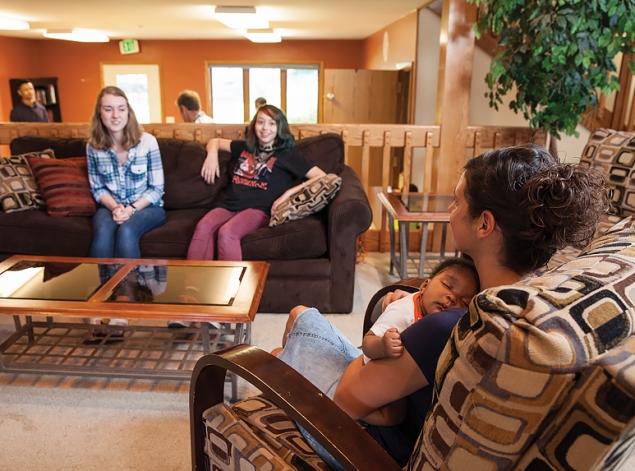If it were easy, everyone would do it.
The truth is, houseparenting is not for just anyone. But what job is? The teenagers who are placed at Gateway Woods are court-ordered by the Department of Child Services, Probation, or sometimes placed privately by their parents. They often come from some of the hardest, toughest neighborhoods in the State of Indiana, many bringing a past with them that is less than lovely. Because of that, houseparents who come with grit, resilience, and an open heart, on top of having a solidly firm foundation on Christ, are the ones who can make the biggest difference in these teens. Every one of these teens is one caring adult away from being a success story, rather than a statistic.
"I have planted, Apollos watered; but God gave the increase." 1 Corinthians 3:6-9
Our Residential program focuses on education, counseling, and spirituality.
Gateway Woods implements a houseparent model approach to nurture struggling youth during their time in our care. The residents are placed for a period of 6-12 months into a specific house on our campus where they reside under the guidance of an assigned houseparent couple. Houseparent families provide a model of spirituality, family interaction, structure, and support.
Each resident is matched with a Masters-level therapist upon arrival at Gateway Woods. We combine individual and family counseling with the rest of their activities in order to address his or her unique needs. We also offer an accredited on-grounds educational program, Gateway Woods School, to all of our residents.
We believe that a strong family life includes prayer and modeling Biblical principles. Involvement in a local church and worshiping together are also important parts of our residential program. Through these experiences, residents are introduced to the power of faith in Christ, and learn the reason behind our staff's commitment to and love for them.
"Where no counsel is, the people fall: but in multitude of counselors there is safety." Proverbs 11:14
The goal of Gateway Woods Residential Care is to serve children who have various struggles such as: oppositional defiant disorder, post-traumatic stress disorder, depression, drug and alcohol related issues, eating disorders, attention deficit hyperactivity disorder, bipolar disorder, adjustment disorders and delinquent/pre-delinquent habits. Our goal is to establish clear expectations, end destructive behavioral patterns, and achieve reunification with families.
If you would like more information about placing your child in our Residential Program, please fill out the form below.
For King & Country appears courtesy of Word Entertainment from the album "'Matter" ℗ Word Entertainment All Rights Reserved. Used By Permission.

Common Questions
While each resident is a unique case, they are usually 12-18 years old and are sent to Gateway by the Department of Child Services (DCS), Probation, or their parents. They come with any number of issues including abuse, neglect, drug or alcohol addiction, behavioral problems, teenage pregnancy, etc. Average length of stay is 6-9 months. They go through an interview process prior to being placed so that we can determine if they will be a good fit for the services we offer.
There are 5 houses on our campus. Oak House is our Teen Mom house and has beds for 3-4 female residents and their babies.
Hickory, Maple, Cypress, and Pine Houses are currently co-ed and can have up to 7 residents at a time.
As a lead houseparent, you will have a separate apartment in the house that you serve in on campus. When you are off-duty you are completely separated from the residents.
As an alternate houseparent, you will mainly live in a house owned by Gateway just up the road in the town of Grabill. All the alternate houses sit in a cul-de-sac in a quiet neighborhood. For the days you are on-duty, you will have a small apartment in the house on campus, which is directly connected to the main part of the house. This is a different apartment than the lead houseparents’ apartment.
Lead HPs are on-duty and in the house most of the month and are the head of a 5-person HP team. There are 9 days a month that they are off-duty and the alternates come on duty to cover for them. They are responsible for setting the rules and carrying out discipline as needed.
Alternate HPs can either be on duty or on maintenance. On duty refers to the 9 days a month when they are filling in for the lead HPs in the house. Maintenance days are the remaining workdays when they are responsible for fixing things around campus, grocery shopping, or just general errands that need to be run for their team. Alternate HPs also get 9 days off a month but they may not always be the weekends as it will depend on the need for coverage in the houses. Most new hires start as alternate HPs and move into lead HPs as they gain experience and seasoned HPs move on from Gateway.
Assistant HPs are the glue that holds the team together. They are the common denominator between the lead and alternate HP couples and make sure the residents are getting continuity of care through excellent communication. They work 1PM to 10PM during the school year, and start a little earlier in the summer months since the residents eat lunch in the houses. They also get 9 days off each month.
A critical part of our mission is the modeling of how a family unit is designed by God. The youth we work with often come from difficult and traumatic backgrounds and there may be times that both you and your kids will hear and see things that you wouldn't have if you weren't houseparenting. Gateway Woods does not place kids who have violent tendencies and has the authority to remove them should they put staff or other residents in danger. We are committed to minimizing the risks to your own children and have found that the proper balance of structure and love greatly reduces those risks.
Being a HP kid can be hard because HPs have the difficult task of juggling their time and attention between raising their own kids and being tuned into the issues of their residents. This is where time management and prioritizing family time is so important. However, most former HP kids say that it’s the best! There is a built in community with the other HP families, which typically means other kids to run around campus with. There are 40 acres to explore, a circle road that is great for bike riding, a playground, a ga-ga ball pit, and a couple trampolines. Campus is a safe place to play where best friends and parents are never too far away.
Each house has a HP team of 5: lead HP couple, alternate HP couple, and an assistant HP who is the common denominator in each house because they are on-duty with both HP couples individually. Each resident then has a counselor who helps them set goals and work through trauma. The school staff and leadership also are part of making decisions that are best for each resident.
Gateway wants to take care of you so that you can focus on taking care of your residents. That is why we offer life insurance, top-notch healthcare with optional dental and vision, and a 403b with an employer match.
Because you will be living in a Gateway-owned house, you will not have any housing expenses like rent/mortgage, utilities, or other bills. You will also have full access to the food and supply rooms, which are re-stocked on a weekly basis with groceries and household supplies like toiletries.
Every day can look completely different depending on the residents in your house and their needs, what kind of errands or appointments that might need to be run, trainings, meetings, and interviewing potential residents. But typically, once the residents leave for school at 8AM, you will have mornings off – this is where family and quiet time comes in. Your assistant HP will arrive around 1PM and the residents return from school around 3. Your evening will be full of dinner, homework, chores, and eventually getting the residents to bed. Then, you will go over resident behavior and progress as a team prior to heading to bed yourselves.
In the summer (June - August), residents have the opportunity to work with you in the mornings on things like mowing, landscaping, or other summer chores. In the afternoons (Monday-Thursday), they have shortened summer classes to help them recover credits, if needed. Most houses also take a "house trip" to places like Cedar Point or Turkey Run State Park to treat the residents to a real vacation.
Initial training and orientation is an intense week or two conducted by Gateway staff. You'll cover topics all the way from the history of the organization to how to handle difficult resident behaviors. Part of the initial training is spending lots of time in the house with the lead HPs and getting to know the teens before your first stint on-duty so you are well prepared. Gateway values ongoing personal and professional growth so there is a minimum 20 hours of training each year you'll be required to complete after you start.
Everything we do is in teams so you never have to feel like you are alone when dealing with any situation. We are all here to help each other learn and grow in this journey together.
As much as they want to be! You will find that the residents typically love having guests over for an evening or going with you to family/social events off campus. They love “adopting” their HPs’ parents as “grandparents” and playing games with guests. Hosting people is a great way to get people involved with the mission and show them the heart of Gateway.
All houseparent applicants must:
- Have a Christian belief and demonstrate a lifestyle compatible with the Apostolic Christian Church of America
- Have the support of his/her local elder or pastor
- Be at least 21 years old
- For couples: Be married for at least 1 year
You don’t need to have:
- Social work degree
- Children of your own
- Certain immunizations
Come with open minds and hearts willing to share the Gospel through living life alongside hurting teenagers. We find that houseparents who are relational, flexible, and resilient tend to be the most effective in this Kingdom work of restoring hope to these teens.
Since we have to have staff on-duty 24/7 to supervise the residents, *someone* has to be on duty on holidays and weekends. Typically, HPs rotate who is on duty during which holiday, but ultimately try to decide as a team to make the best decision that works for the house. [See the question above about the difference between leads and alternates for more details on how schedules work.]
The Gateway Woods School operates year-round, with shortened school days in the summer months. This helps the residents who need to recover credits but also gives the teaching staff and houseparents a chance to tag-team during the summer.
Testimonials
A Day In the Life of an Assistant Houseparent
Afternoon 1-6 PM
As an Assistant HP, your work day starts at 1PM with checking the residents’ rooms for cleanliness and for any items that may need to be confiscated. Dinner prep begins and when the residents arrive home from school, you’ll provide them a healthy snack and any homework help they may ask for.
Evening 6-9 PM
After dinner, you’ll make yourself available for the residents to help with homework, talk one-on-one, do a project, a craft, a game, etc. Around 8:30 pm, you’ll round up another snack, dispense any medications, and send the residents to bed.
Logs & Scoring 9-10PM
To end your work day, you’ll meet with the houseparent couple that’s on duty to log and score the residents. You’ll discuss each resident’s behavior, events of the day, progress, any changes that need to be made, etc. You are the common denominator between the lead and alternate houseparent couples. You make sure continuity of care is happening for the residents in your house.
Other Responsibilities
Weekly grocery trips, meetings, trainings, running appointments, and potential resident interviews are all common happenings that occur at irregular intervals. Every day is a little different, depending on the residents in your house and where they are at in the treatment program.
Houseparent Leadership

Jesse Zimmerman
Houseparent Manager
